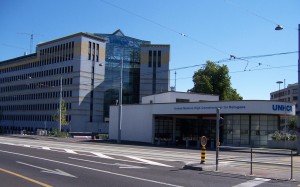On 17 July I toured the United Nations Office at Geneva and the International Red Cross and Red Crescent Museum. They are across the street from each other in a district which also hosts the Musée Ariana, the Botanical Garden of Geneva, and seemingly many international organizations set up by people from all countries.

Office of the United Nations High Commissioner for Refugees – I think this building was once a gas station
The RCRC Museum was both scary and encouraging. They had an exhibit called “the witnesses” in which they had recorded people who had been in some kind of crisis, then at the museum they played their monologues on videos which presented the speakers as life size persons for museum guests to stand in front of and hear as if in a conversation. There was a room of boxes with paper cards in them which kept records of prisoners of war and requests for missing persons during World War I. In other parts of the museum I was reminded that I was no longer in America. There was an exhibit in which a former prisoner at the Guantanamo Bay detention camp talked about torture he endured at the hands of American soldiers while held there. He professed his total innocence of crimes, and elsewhere there were exhibits stating that the United States forbid fair humanitarian checks on health and fair detention by the RCRC. I can imagine that these accusations would be taken as very offensive by people in the US government. Elsewhere there was an exhibit on Wikileaks talking about how confidential messages between the RCRC and the US government were leaked, and that they described pressure from the US government on the RCRC for that organization to not report that it was be disallowed to review prisoner conditions at Guantanamo.